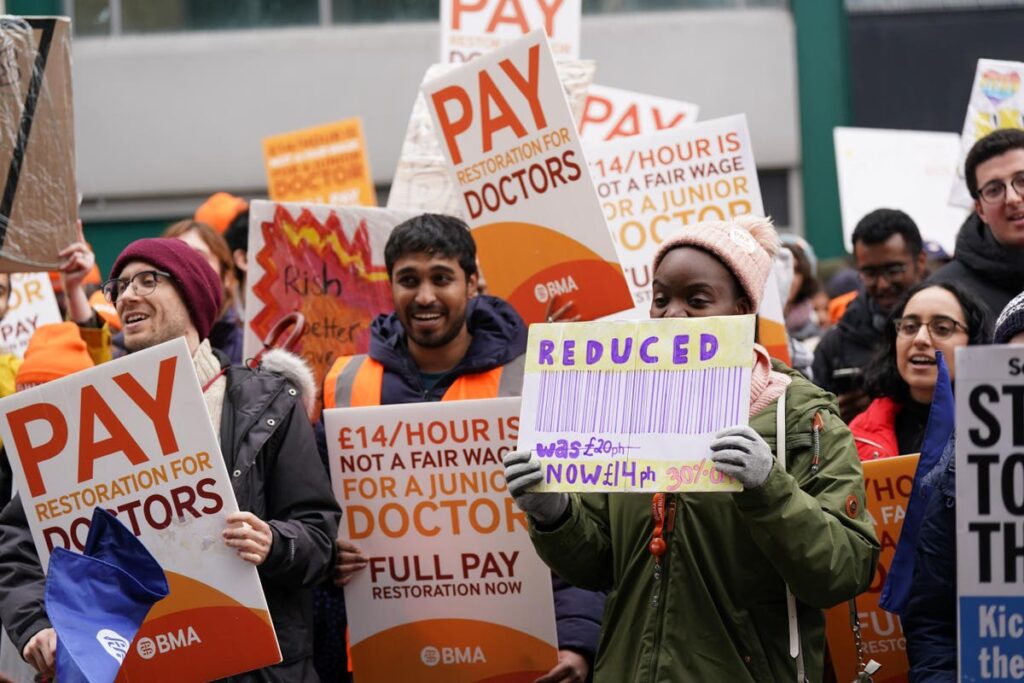NHS junior doctors take part in a march and rally in the centre of Birmingham, on the final day of … [+]
Junior doctors in England will once again walk out as part of a long-running dispute over pay.
These physicians — qualified doctors with up to eight years’ clinical experience — plan to strike over three days in June after criticising a pay deal proposed by government.
They make up around 40% of the medical workforce, so their absence has a major impact on hospitals.
The disruption comes as the country continues to grapple with an enormous backlog in elective care and major pressures on its emergency health services.
ADVERTISEMENT
The last walk-out — which took place over four days in April — is thought to have resulted in almost 200,000 cancelled or delayed appointments as hospitals struggled to cover lost shifts.
Doctors in England’s National Health Service are public sector employees whose pay is ultimately decided by ministers.
Although politicians take recommendations from the independent NHS Pay Review Body, they are ultimately responsible for deciding compensation levels.
Union leaders argue that junior doctor pay has risen far slower than inflation, leaving employees out of pocket. The British Medical Association, which has called on its members to strike next month, say real-terms pay has fallen by more than a quarter since 2008.
ADVERTISEMENT
Leaders from several unions involved in healthcare disputes argue that higher pay would make it easier to recruit and retain staff to an already-overstretched workforce.
As the country’s population ages and demand for healthcare grows, having a good supply of doctors will be crucial for patient safety, they say.
Ministers previously offered junior doctors a 5% pay rise, but union leaders say this is not enough to end the dispute.
A message on the British Medical Association website reads: “In response to the Government’s paltry 5% pay increase offer we are calling for a full 72-hour walk out of all junior doctors in England.
“Junior doctors deserve full pay restoration now – and the goal of this third round of industrial action is to force the Government to put forward a credible offer.”
Health and Social Care Secretary Steve Barclay said it was “disappointing” junior doctors planned to hold another strike.
ADVERTISEMENT
“We made a fair and reasonable offer, and were in active discussions on a range of issues,” he added in a social media post. “I am still keen to continue talks if these hugely disruptive strikes are called off.”
Industry leaders fear the latest strike will create further disruption for hospitals already struggling to hit pandemic recovery targets.
ADVERTISEMENT
NHS organisations have already missed an April deadline for reducing the number of patients waiting more than 78 weeks for elective treatment — a situation one senior NHS England figure controversially blamed on previous strikes.
Industry journal HSJ disputed the impact of this specific strike on waiting lists, stating it understood that hospitals were already on track to miss the deadline.
Nonetheless, Saffron Cordery, deputy chief executive of industry group NHS Providers, says that union leaders and government needed to start “vital serious talks” to avoid further disruption to care.
She added: “We understand junior doctors feel they’ve been pushed to this point by factors including below-inflation pay uplifts and severe staffing shortages.”
ADVERTISEMENT
If the planned strike goes ahead, it will take place from 7 a.m. local time on June 14th until 7 a.m. June 17th.


